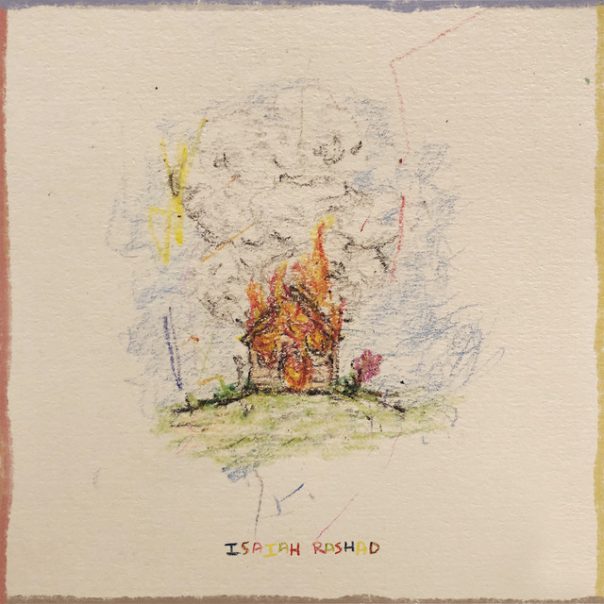ALBUM REVIEW: Isaiah Rashad returns to find ‘The House is Burning’

It’s been some time since we last saw Isaiah Rashad; since his critically acclaimed 2016 album, The Sun’s Tirade. The Top Dawg affiliate has been vocal about his struggles with mental health in his art and in interviews, expressing how it has at times derailed his focus. But the wait is finally over with his follow-up, The House is Burning.
The House is Burning
Isaiah Rashad
Top Dawg Entertainment, July 30
7/10
Much like its predecessor, the album maintains a strong focus on Rashad’s mental health at its core. He copes with substance abuse, isolation, trauma and dissatisfaction. The album’s production carries a dreamlike quality. There are meditative tones and synths atop thick bass riffs and a heavy helping of jazz—serving as a medium in which listeners can really get a sense of the perpetual despondency wracking Isaiah Rashad.
Opening track “Darkseid,” a reference to the DC Comics villain, kicks off with the sound of a cassette tape put into a player as cool, jazzy piano is accompanied with strings. Rashad raps about the pursuit of wealth and the fleeting value of money, insofar that it’s only as valuable as one makes it. Looking at it from the hierarchy of needs, it kind of makes sense. “From The Garden,” featuring Lil Uzi Vert, is a go-getter anthem where Rashad emphasizes his intent to give everything his best from the get-go. Backing horns and a soulful choir beginning quickly transitions into a bass/trap instrumental with a prominent clapping snare—a mesmerizing misdirection, to say the least.
“RIP Young” takes a laidback, cruising appeal as the snare rattles on, with Rashad reflecting on how his fame and success have changed and even soured some of his previous relationships back home. Duke Deuce joins in on “Lay Wit Ya,” which samples “Ridin’ n’ tha Chevy” by Three 6 Mafia. Rashad and Deuce rap about how success makes them feel cold to the world and other people. It’s followed by “Claymore,” with Smino, which opts for a more organic sound using hand drums and clacking sticks alongside an ambient instrumental.
“Headshots (4r Da Locals)” takes a significantly more somber tone, as Rashad tries to drown out the persistent pain and sorrow he endures with drugs and alcohol, women, partying and luxuries—all of it to no avail. “Yeah, I tell a bitch eat it like Doja Cat/ You see the wrist whip it like Bouldercrest/ I got a crib bigger than Budapest/ And the shots ain’t bringin’ my soldier back,” he raps. “All Herb” follows in kind but here Rashad takes on a more cryptic style, waxing about feeling more dead than alive over hollow synth tones and rumbling bass and snare. Jay Rock and Jay Worthy join in on the subsequent “True Story” with a jazzy electric guitar instrumental that feels reminiscent of Jay-Z’s “The Story of OJ.”
The funky, bass-led groove of “Don’t Shoot” sharply contrasts the serious focus of the song’s subject matter. Rashad critiques police brutality but also raps about different kinds of conflicts that can escalate into violence. “Score” brings home the dreamy quality with the warbling organ and bass melody, as SZA melts the track with her voice.
The album comes to a close with “THIB” (the title track) and “HB2U,” with the former seeing Isaiah Rashad reflect on how his internal demons persistently torment him. The titular burning house is a metaphor for his state of mind. The latter feels almost like a grounding exercise, as Rashad takes the time to be mindful of his world and the people and things in it. It ties it all together, as a step back to remind not only himself but listeners to take things one day at a time.
Follow editor Tim Hoffman at Twitter.com/hipsterp0tamus.
